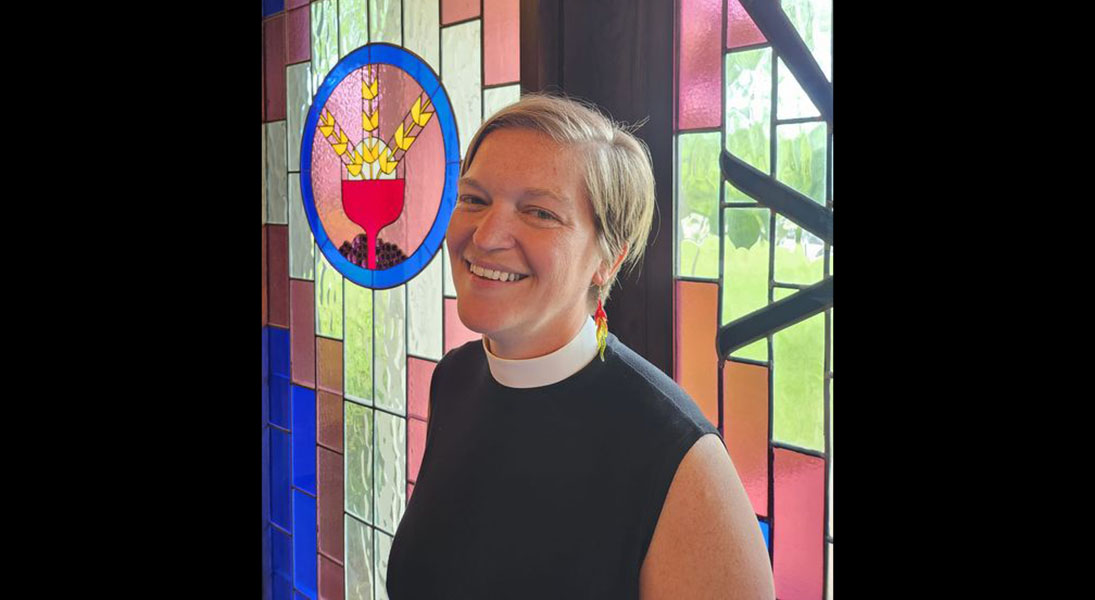As a recent guest preacher at All Saints Lutheran in Oklahoma City, Becca Middeke-Conlin remembered an older member of another congregation asking her why they needed to learn new hymns. “What this person forgot is that all hymns were new once,” said Middeke-Conlin, pointing out that many beloved Lutheran songs were written less than a century ago. “Because our grandparents and parents were willing to learn new things, including new hymns, we now have traditional favorites. And we cannot create new traditions unless we are open to new music and new opportunities and new experiences and new ministries now.”
That philosophy should serve Middeke-Conlin well when she becomes bishop of the Arkansas-Oklahoma Synod on July 1. A native of St. Louis who spent her teens in Minnesota, the bishop-elect served a variety of congregations in Connecticut and Pennsylvania before coming to the synod in 2021 as director for evangelical mission and assistant to the bishop for youth and young adult ministry. She will be installed as bishop Oct. 14 at Fellowship Lutheran Church in Tulsa, Okla.
When Middeke-Conlin spoke about the decreasing membership that is the synod’s greatest challenge, her words might have come right out of her sermon in Oklahoma City. “We are already a small synod, [so] I think we feel each loss much more deeply than in larger synods,” she said. “But [it’s] also a good opportunity … to say that the church has changed, just as the world has changed. How can we do ministry in new ways … that make church interesting, that make church relevant to our lives and not something we do the exact same way our grandparents did?”
The bishop-elect brings to her new role a history of nudging the church forward. In fall 2019 she helped launch the annual “We Love …” event, a day of LGBTQIA+ outreach hosted by the Northeastern Pennsylvania Synod, and since moving west she’s been involved in Building Bridges, the Arkansas-Oklahoma Synod’s racial justice program.
The latter was already well established when Middeke-Conlin arrived at the synod, and she was enthusiastic about its track record of educating synod members about structural racism. “Right now, we’re doing our 40-day racial equity challenge, which we completely stole from the North/West Lower Michigan Synod, I believe, with a shout-out to them, that they had done for a Lenten series a few years ago. And we will be doing a unity walk in June, which will be the third annual one.” The first, in 2021, commemorated the 100th anniversary of the Tulsa Race Massacre—an emotionally charged observance given that members of the Building Bridges team from the city’s north side had grown up around survivors of the massacre.
How can we do ministry in new ways … that make church interesting, that make church relevant to our lives and not something we do the exact same way our grandparents did?”
Asked about the synod’s youth ministry, Middeke-Conlin said it was still “rebuilding after a few years of not being able to do anything” during the COVID-19 pandemic. But she feels strongly that if young people are to be drawn into the faith, they must be seen and heard. They will participate, she argued, if “they feel like they somehow make a difference, that [their] being in worship made a difference, whether they have a leadership role or feel like they are able to offer up prayers.” The same goes for their larger participation in the church. “It’s that place to belong and have connectedness, and then also a place where they feel they can use their gifts and skills to make a difference in the church or in the life of the community.
In her Oklahoma City sermon, Middeke-Conlin reflected on the stoning of Stephen in Acts 7 and the danger inherent in leading people where they’d rather not go. “We’re … afraid of change,” she observed, “which is a little ironic considering how the Lutheran church was founded because of change. We are like those rumbling and complaining at Stephen in our lesson today. We hate that things are changing, and we think that as a result we will lose our history and our traditions that we have grown to love.” Preserving those traditions but continuing to move the synod forward may be Middeke-Conlin’s greatest task.







